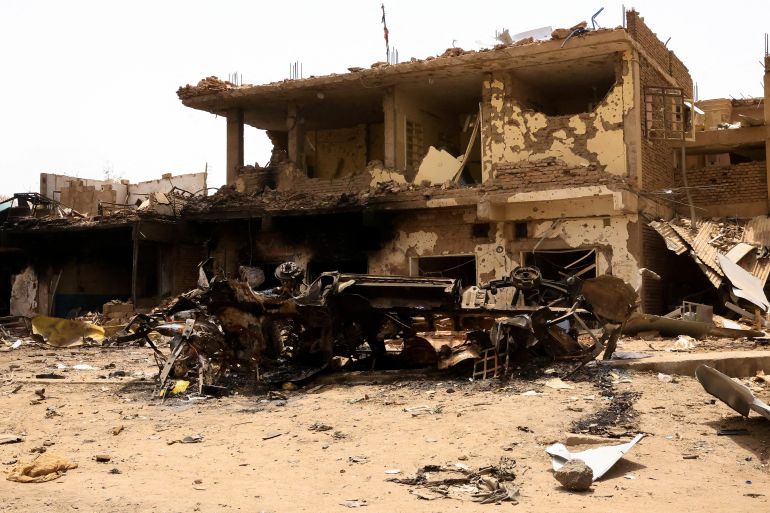Fighting in Sudan’s Omdurman intensifies as displaced tops 4 million
The army is trying to recapture territory lost to the RSF by taking back control of a bridge across the Nile.

Fighting in war-torn Sudan is showing no signs of abating, as the Sudanese army intensifies its effort to regain control of the country’s capital, the site of one of the heaviest battles the conflict has seen.
Khartoum and its twin city of Omdurman have been the main theatre of fighting between two warring factions since mid-April.
Keep reading
list of 3 itemsSouthern Sudanese leader John Garang’s mysterious death
With no end to the fighting, Sudanese find refuge at camps in Chad
Back then, a rivalry between General Abdel Fattah al-Burhan and Vice President Mohammedi “Hemedti” Hamdan Dagalo – the heads of the military and of the paramilitary Rapid Support Forces (RSF) respectively – broke out into war.
The army has launched air attacks and fired heavy artillery since Monday, residents said, in an attempt to take control of a bridge across the River Nile used by the RSF to move reinforcements and weapons from Omdurman to the other two cities that make up the capital’s metropolitan region, Khartoum North and Khartoum.
The RSF, which occupied much of the capital at the outbreak of the fighting in April, responded forcefully, resulting in heavy clashes in residential neighbourhoods and civilian casualties and displacement. Both sides have claimed military advances in recent days but there are no signs of a decisive breakthrough.
The arrival of seasonal rains has caused displacement in some parts of Sudan and concerns that waterborne diseases will spread further.
‘A terrifying situation’
“The situation in Omdurman is terrifying,” Nader Abdullah, a 52-year-old resident, said. “Gunfire, the sound of artillery, and air strikes … there’s bombardment in every direction.”
On Tuesday, health authorities said at least 20 people died in Omdurman, adding that the country’s healthcare system is close to a complete collapse after months of fighting. The United Nations reported at least 53 attacks on health facilities across the country since the beginning of the conflict.
On top of the fighting, residents in Khartoum have had to contend with extended power and water cuts, rampant looting by the RSF, and decomposing bodies.
“Neither side is able to win outright and what we hear them say in the media is the opposite of what’s happening on the ground,” said Mohamed Usher, a 37-year-old living in southern Khartoum. “What’s left in Khartoum for them to win anyway? The institutions are destroyed, the universities, the markets are all destroyed.”
With corpses in the streets of the capital and morgues overflowing four months into the conflict, Save the Children has raised the alarm about “the risk of major disease outbreaks in the city”.
Sudan has seen repeated cholera outbreaks in recent years, and doctors have warned of a renewed threat as a result of the war.
“A horrifying combination of rising numbers of corpses, severe water shortages, non-functioning hygiene and sanitation services, and lack of water treatment options are also prompting fears of a cholera outbreak in the city,” the London-based charity said on Tuesday.
Four million displaced
The situation is also dire for those who managed to flee from their homes, either to other cities of Sudan or to neighbouring countries.
The UNHCR said that at least four million people have been displaced, including more than 900,000 who have fled to neighbouring countries already grappling with conflict and economic crises.
The highest number – more than 377,000 – have fled to Chad from the western Sudanese region of Darfur, where witnesses have blamed Arab militias aligned with the RSF for a wave of ethnically targeted attacks against non-Arab groups.
“The UN Refugee Agency, is deeply worried about deteriorating health conditions across the country, including in refugee camps as well as at border entry points and transit centres in neighbouring countries, where people forced to flee are arriving,” the UNHCR said on Tuesday.
“As many families have been on the move for weeks – with very little food or medicine – rising malnutrition rates, disease outbreaks and related deaths continue to be observed,” it added.
Between May 15 and July 17, more than 300 deaths, mainly among children less than five years old, were reported due to measles and malnutrition, according to UNHCR.
As casualties and the number of displacements have kept rising, diplomacy appearred to have stalled with a string of different efforts – from talks spearheaded by Saudi Arabia and the United States, to regional attempts from the African Union and the regional East African group IGAD – failing to yield concrete results.